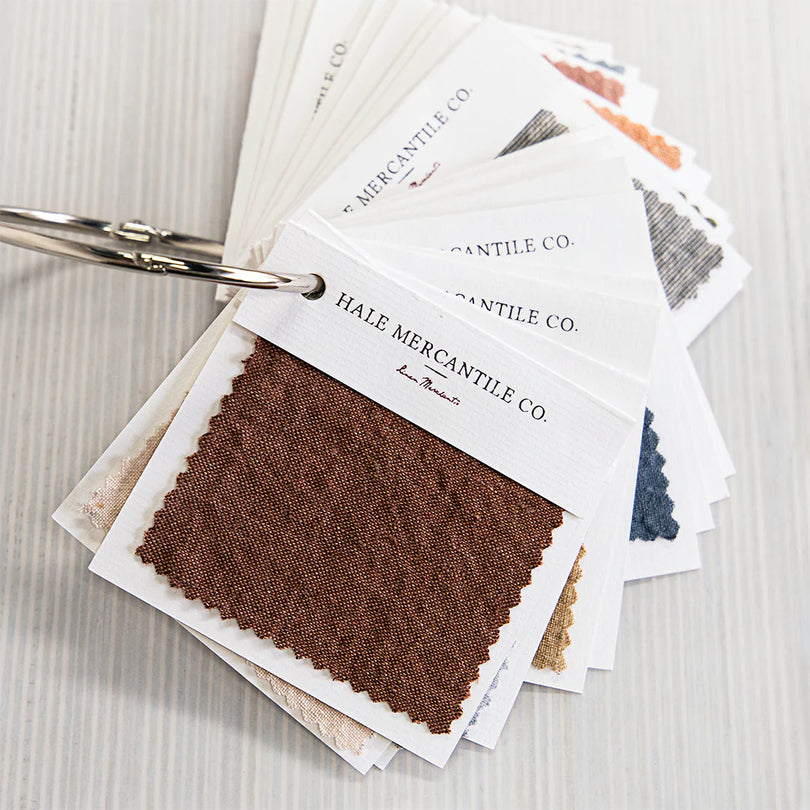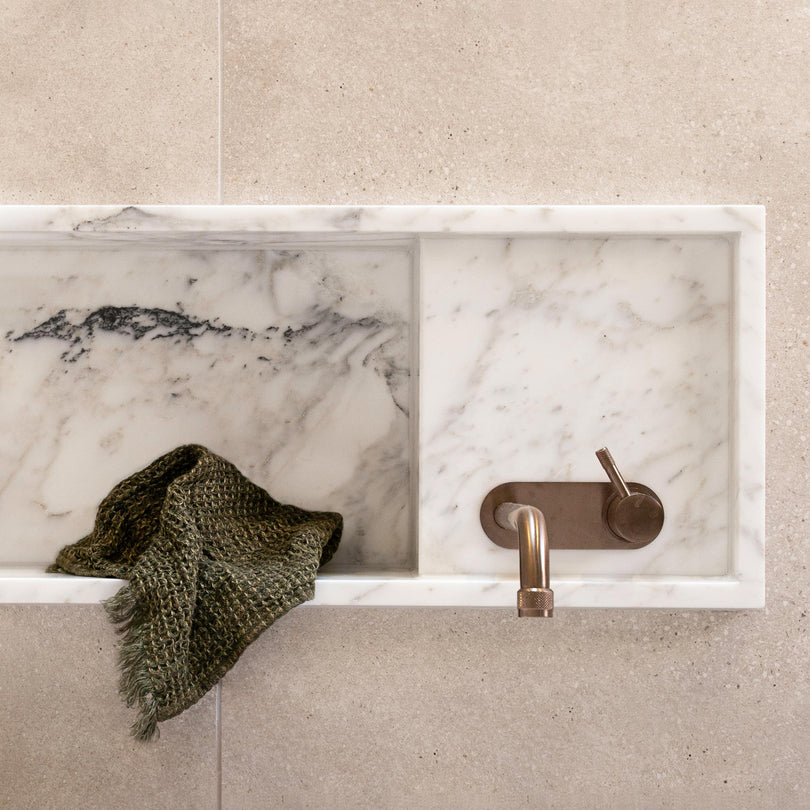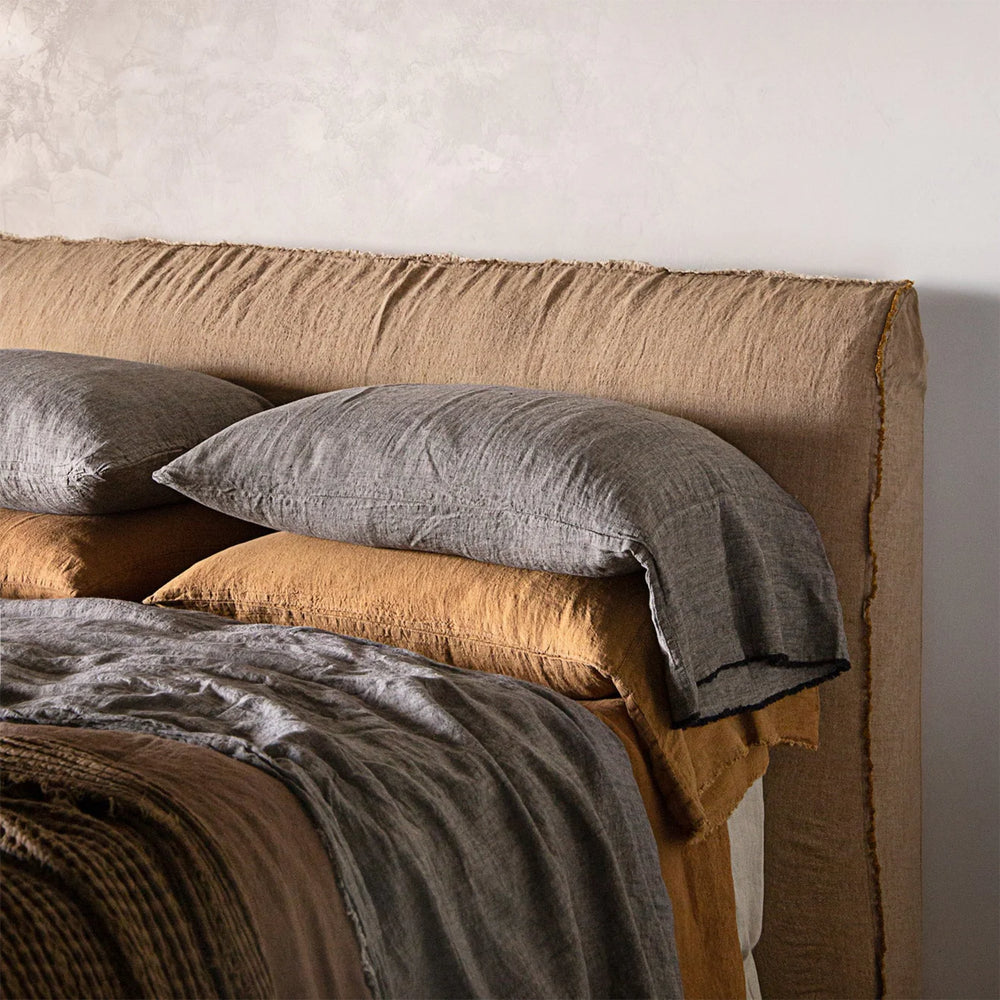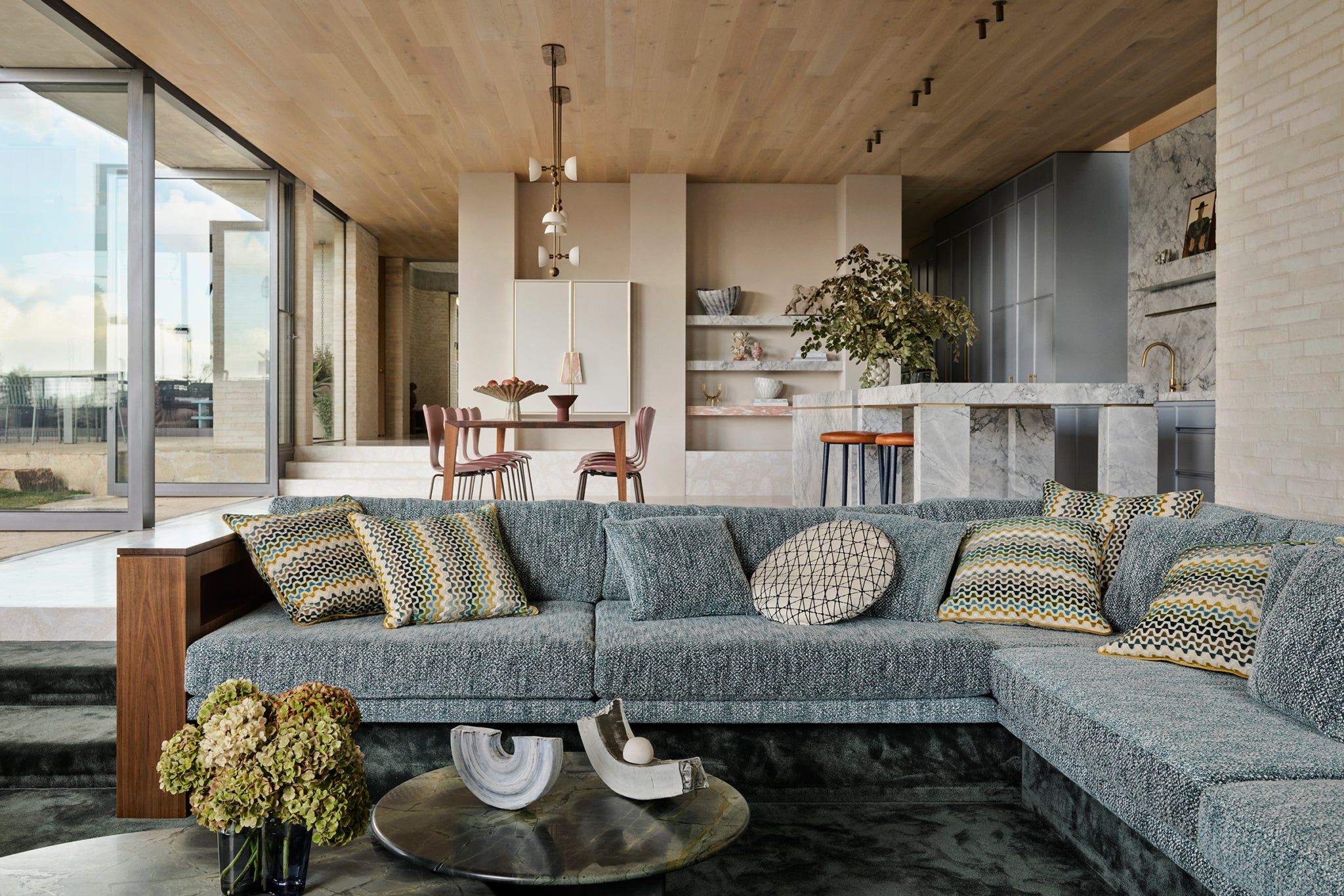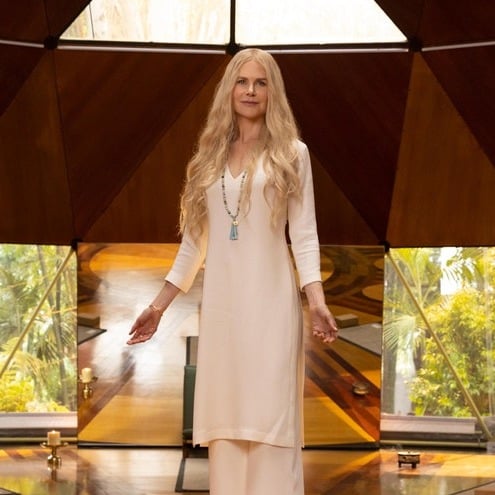
Nine Perfect Strangers & Hale Mercantile Co.
It was a pleasure to work with the wonderfully talented Glen Johnson on the hit series, Nine Perfect Strangers, now streaming on Hulu, with the set decorator choosing Hale Mercantile Co linen to style the luxurious, light-filled bedrooms featured throughout the show.
Based on the novel of the same name by Australian author Liane Moriarty, whose bestselling book Big Little Lies was adapted for TV by HBO, the eight-part series stars Nicole Kidman and Melissa McCarthy as well as numerous Australian actors including Asher Keddie and Samara Weaving.
The story is centred around luxury wellness retreat Tranquillum House, where things are not all as they seem. Masha, played by Nicole Kidman, is the retreat's intense yet unnervingly calm leader, while nine guests who have come for a 10-day stay in the hopes of healing their trauma and becoming the best version of themselves are guided and manipulated by the ethereal guru's questionable methods.
Although the series was originally set to take place amidst the stunning natural beauty of California's Big Sur, COVID-19 led to production company Made Up Stories (the same team behind Big Little Lies) relocating the cast and crew to Australia one month before they were due to start work. Filming then commenced at two picturesque properties in the Byron Bay hinterland – 22-acre wellness and yoga retreat Soma and sustainable timber plantation Lune De Sang.
The high-end set design received plenty of attention, with a write-up in Architectural Digest detailing the timber and glass interiors and lush, green landscape. In the article, Johnson describes the setting as having a 'mid-century modern meets zen vibe', while both locations were decorated with 'classic mid-century furnishings and lush linens' to soften up the spaces. The set also features locally made artwork and ceramics.
A relaxed, resort style is achieved by layering our signature Flocca range of bedding in various hues including the rich, earthy rust of Russo and the muted gold of Maiz, which fit seamlessly into Tranquillum's warm and serene rainforest surrounds. The bedroom of Melissa McCarthy's character, romance writer Frances, features our Flocca Linen Duvet Cover in Russo, with accents of Maiz and Brun, no doubt chosen strategically by Masha to evoke a deep and restorative night's sleep. Shop the Nine Perfect Strangers bedding set here.
In another scene, grieving mother Heather, played by Asher Keddie, rolls around in a bed layered with HMCo pieces in tones of Brun and Sable, enjoying the cool touch against her skin. 'These sheets are so good... They're really cool on my skin,' she says, and while it may be the psychedelics talking, we're pretty sure Asher would appreciate the sumptuous, tactile pleasure of pure linen in any setting.
To view bed linen in our bestselling hues Brun and Sable click here.
Visit Shop Our Style to discover the exquisite pure linen pieces that are adored by stars, designers and decorators alike.
READ MORE

Project Feature: Studio Esteta - Mornington Peninsula House
As a brand committed to quality craftsmanship and purposeful design, we felt an instant affinity with this considered refurbishment project by Studio Esteta, set against the stunning background of Victoria's Mornington Peninsula.
The thoughtful renovation of an existing Merchant Builders home celebrates the region's deep history and works harmoniously with the surrounding landscape. Central to the space is a light-drenched living area, where glazed windows take in sweeping views of the property and create a fluid connection between the interior architecture and the natural beauty outside. The clever layout is complemented by a palette of warm timbers and textured stone and paving, with an acute attention to detail in both aesthetics and function seeing the project shortlisted as a finalist in the 2021 TDF + Laminex Design Awards.
Set in this raw environment and demonstrating a sensitive balance of rustic and refined, the rich, earthy tones of our Armee and Russo bedding proved to be the perfect fit for the project. Much like the way the palette and materials chosen by Studio Esteta mimic the textures and tones of the rolling paddocks and farmland, the deep khaki of our Armee bedding is reminiscent of lush, remote pastures. Evoking the calm of a wide and verdant landscape, the pairing of Armee with the rich rust tone of Russo imbues the bedroom with an effortless elegance that reflects its natural surroundings.
The spacious, rural home also features our pure linen range in the living area, where our Flocca Linen Cushion in Russo and our Crush Linen Throw in Brun blend in impeccably while adding a touch of luxurious comfort. A beautifully rich toffee tone, Brun's subtle melange offers a further layer of textural appeal to the room when draped loosely over the lounge.
With carefully selected finishes enriching the home with warmth and depth, this design project exemplifies an enduring style that is both modern and timeless.
For more information on the Mornington Peninsula House, visit Studio Esteta
READ MORE

Bathroom stories - Marble and European Linen
Ancient and innate used for centuries in architecture, marble undoubtedly represents a token of wealth and grandeur. Cut and honed, it is still regarded as a very desirable material in modern design. This age, with modern export capacities, the options of unique colours and veins from all over the world are at our finger tips, allowing global designers to push the boundaries on traditional marble uses and styles past just bathrooms and kitchens.
Even so, while this amazing material is durable, multipurpose and creates exceptional visions of work, the negatives are that it can have a cold, hard and sometimes ridged aesthetic. Without complementary partner finishes and styling, it can lack warmth in a residential setting.
To outweigh the negatives, designers source warm and reflective lighting and an engrossing elements of texture such as European linen.
European linen has been handcrafted through the ages offering an unsurpassed relaxed textural appeal. We feature to you, the perfect juxtaposition between both elements. Our revered Australian design firms are showcasing the the opportunity to soften a space with pure linen bath waffle whilst maintaining the integrity of the room.
Pure linen is not only a style to covet, it is also a respectful nod to one of the oldest architectural materials by being an ancient material itself; with production technique hardly altered for hundreds of years.
Enhance your bathroom with our pure waffle bath towels, available in four sizes and a range of muted, earthy and luxurious tones.
Photo credit:
Flack Studios (Image 1 and 4)The Local Project (Image 2)Est Living (Image 3)
READ MORE

Welcoming our new hue - Petra
We are pleased to release the final hue to our 2020 palette additions as we welcome Petra. Not a white nor a cream, Petra summons the delicate detail of a very pale stone. Petra makes its debut as a core colour way within our collection. The perfect hue when one does not want to fuss over keeping whites white.Petra is designed to create a soothing and grounded aesthetic. Partner it with our colour ways of Ayrton and Sable to imbue a sense of cool and calm. Alternatively bring to life a contemporary palette by combining with our new tones Rok and Kali.
To elevate your interior bedroom style, incorporate timber finishes and whitewash walls. There are many different shades of white, and establishing a monochromatic or neutral interior style is not always easy. We recommend doing your research, trawl Pinterest for styling ideas and your favourite interiors magazine, such as Real Living for global trends.
Petra - now available within our pure linen bedding, living accessories and table linen collection. Book your complementary design consultation with us. We will provide colour selection and styling advice for any space of the home.
READ MORE

Style Siren Series - The Log Box
We are always delighted and intrigued by the beautiful spaces that our pure linen collection goes to feature in. So much so that we have decided to bring you style and inspiration from those that we consider to be our Style Sirens.We are located this week in the arresting hinterland of the Mornington Peninsula. A mecca for an array of award winning wineries and restaurants, however our feature this week, Log Box in Red Hill, implores you to take a back seat to the hive of activity.
In true sense of seeing the beauty in all things, Chloe Burgess and her husband identified dilapidated dairy sheds on their Red Hill acreage as an opportunity for a conversion to boutique, unique accommodation.
With rolling views extending out to Western Port Bay, the two converted cabins offer an intimate, minimalist retreat where guests are encouraged to reconnect with each other and the landscape around them.
Remaining true to its authenticity and environment, the original timber truss roof and raw ply lining are prominent features that project warmth and an intimate, cosy atmosphere. The cabin has been minimally furnished in keeping with the theme of the property. The open - plan bedroom has been simplistically styled with Flocca linen bedding in cool Fog. The loveseat featuring our Flocca Macaron cushions and draping linen curtains provides an inviting a nook to witness the dramatic sunrises of the morning.
The wood fire heater in the living area calls you to nestle into the bespoke sofa and settle into the easy luxury of our Flocca cushions. The intimate space is simply inviting you to pop the cork on a local bottle of wine and open the deck of playing cards.
The Log Box cabins show you that there is no place you need to go and no where you’d rather be.
For accommodation information: The Log Box Dairy Shed
READ MORE

Autumn Edit 2020
The autumn shift ushers us into a season brimming with nature, melancholy and a calmness we’ve been craving. Whilst the temperature may begin to drop, we may find warmth and solace in the simplicity of natural, trans-seasonal fibres and quality craftsmanship in the pieces that we adorn our home with.
This year we will relish in the composure of natural hues of grey, white, blonde and sage. Whilst subtle to show, they are rich in their application, a juxtaposition of stillness and depth.
Interiors trends sees provincial back in, but not in a traditional sense. Think paired back – a rural adaptation of classic design using hardy, textural and rustic materials and earthy colours. Venetian plaster, French wash, striped back floorboards and stone are complemented by natural fibres of linen and wool.
Furthermore, a strong emphasis on artesian craftsmanship. On trend and here to stay is the importance of slow movement. This translates to investment pieces purchased with intent. Quality design and sustainable workmanship is a non negotiable.
Create your autumn style with our pure linen palette of Sable, Nox, Cep, Argent, Tempest and Ayrton across Linen Bedding and Linen Accessories.
Perfect for the seasonIntroduce our favourite layering pieces from our collection:
Alpaca Linen Throw - TempestCrush Pure Linen Throw - ArmeeFlocca Linen Cotton Blend Blanket - AyrtonCrush Merino Wool Blanket – Nox
Photo Credit:Elle Decoration - Honfleur, Normandy. Photography Gaelle le BoulicatVogue Living - Axel VervoortEst Living - Audo residence Copenhagen by Norm Architects
READ MORE

Style Siren Series - 28 Degrees
We are always delighted and intrigued by the beautiful spaces that our pure linen collection goes to feature in. So much so that we have decided to bring you style and inspiration from those that we consider to be our Style Sirens.This week we find ourselves again in a playground for the humble…as well as the rich and famous; Byron Bay. Somewhere in the middle of the contrast we have been caught in the luxurious charm of a quintessential Australian beach side guest house, 28 Degrees.
This family run guest house oozes a bare foot repose, with its classic timber panelling, and lush tropical gardens. No comfort has been spared in this fresh white walled wonderland of luxury accommodation. Boasting a somewhat understated approach to styling, yet uncompromised attention provided to the details of each room.
Known for its eco-conscious attitude, there are considerations such as low toxic paints, recycled timber floorboards, cleverly positioned windows for air circulation and the family even donate unused toiletries and food to local charities.
Rooms within the guest house are adorned with Hale Mercantile Co. pure European linen in playful yet romantic tones of Floss and Fog. Each bed framed by our versatile Flocca linen slip bedhead, the Flocca edging is a delicate contribution to the simple luxury of each room.
You won’t find tightly tucked sheets and piles of cushions to navigate. On the contrary, scrumptious relaxed layers of breathable linen and the comfort of the generous Flocca body cushion is enough to dial down to the beach excitement and turn your attention to a good book. The inclusion of the Kristine range of bed linen adds just the right balance between beach house and a hint of old world romance.
Our Pastel hues of Floss, Fog and Sable are grounded with darker hues in Tempest and Nox encapsulating the tranquility associated with the beautiful accommodation and the town it is situated in.
READ MORE

Our Top 9 Instagram Posts for 2019
Our most popular Instagram images for 2019, as loved by you. We've enjoyed bringing you our hand-selected curation of relaxed, sumptuous and luxurious linen images.
Showcasing our earthy and natural palette, incomparable texture and quality and style, it's been a joy to inspire you and share with you our passion for pure European linen.
Thank you for following us and allowing us to be a part of your world. We look forward to bringing you more inviting and inspiring images in 2020.
READ MORE

Style Siren Series - The Repose
We are always delighted and intrigued by the beautiful spaces that our pure linen collection goes to feature in. So much so that we have decided to bring you style and inspiration from those that we consider to be our Style Sirens.
This week we nestle into The Repose, a historic cottage escape the rural NSW town of Dubbo by Saddler and Co's Jemima Alridge.
Originally a humble worker’s cottage built in 1904, Jemima sought to weave elements of modern style side by side with heritage inspiration in the meticulous renovation. The result is a thoughtful space that exudes quintessential Australian charm and invites a sense of connection and a place to rest your senses.
With a nod to the European heritage that shapes the country, the original features of the cottage have been preserved and complemented with the renovation. The high timber ceilings and original timber flooring have been rejuvenated with a simple white lime finish. Artisan elements such as handcrafted tiles, antiques and brass and the inclusion of pure European bed linen and accessories have shaped a space that welcomes connection, rest and comfort.
Subtle links of the past and the environment intertwine through each room. Hale Mercantile Co. linen features in a palette of Russo, Moro and Sable to draw reference to the dusty plains and red soils of the area.
The inclusion of the Kristine range of bed linen encapsulates the essence of the building and it's location - rustic, romantic and a place with the heart of the Australian hospitality.
Thank you to Jemima Aldridge, for bookings please visit The ReposePhoto credit: Abbie Melle
READ MORE

Style Sirens Series - The Range
Style Sirens – The Range, Byron Bay
We are always delighted and intrigued by the beautiful spaces that our purelinen collection goes to feature in. So much so that we have decided tobring you style and inspiration from those that we consider to be ourStyle Sirens.This week we are welcomed into ‘The Range’, a sprawling property ofTom and Emma Lane nestled into the picturesque Bryon Bay hinterland.
The family’s consideration of sustainability and the environment ishonoured throughout the expansive home, in both architecture and design.With a strong influence of European finishing and styling, you would beforgiven to think that you had been transported to a farm house in the Mediterranean.
The Range sits on 120 acres and located at a vantage point to the rollinghillside and beyond to the sea. The principles of appreciating the outsideenvironment is evident in the raw and organic fittings, including originaltimber beams, muted terracotta tiles and a natural palette in pure linen bedding.
Merging the exterior environment with interior finishes is a style werevere at Hale Mercantile Co. Emulating the rolling, dusty countryside,selecting pure linen bedding in warmer tones of Brun (Toffee melange),Carmel (sun bleached caramel) and Cep (Mushroom) have beenutilised to great effect. Rosa has been subtly selected to complement the clay,pink tones of terracotta. Styling has been purposely left unfussed,relaxed and understated.
The Lane’s underpin a strong ethos and commitment to giving back tothe environment and community. They own three properties in the region,including The Farm, - a working farm with a collection of micro-businesses,each share the same ethos with traditional and sustainable practices.However, their work in the sustainability space is not limited to theseproperties, with the recent completion of The Beach House East Coast,an event space for retreats and conscious conferencing - proceedsfrom this venue benefit their environmental trust.
Thank you to Emma LanePhoto credit: Alicia Taylor
READ MORE

The Season For Entertaining
The dining table in any home is a place of communication and connection which we believe should exude a true sense of ‘home’.
Whether a time for celebration, entertaining during the festive season, or simply when the family takes a moment to come together at the end of a day, take the opportunity to create your own sense of style in the focal point of your home.
As the weather warms up and the yard comes alive to the tune of chirping birds, embrace the change and open your doors to friends and family. Of course, don’t forget to enjoy what culinary delights the change of season will bring!
Our entertaining table style is considered sophistication, enhanced with a nod to the pinks hues and tones that has been featuring heavily on the European summer tables.
Pure European Linen – it goes without saying, the functional and style staple of your table is the quality, pure linen tablecloths, runners and napkins. Be playful with hues of soft blush, paired with intensified pinks. Our choice of the season is our Rosa and Moro, complemented by accent colours of rich blue and greens, such as Armee or Fonda.
A touch of imperfection – the iconic handmade ceramic collection of Astier de Villatte will bring the perfectly-imperfect to your table. Centuries of artisans handiwork in each captivating ceramic piece. A must have indulgence.
Mismatched vessels – composition is the trick to incorporating different shapes and textures. Consider ripple vases or glasses paired with earthy stoneware or ceramics.
Coffee table books for the dining table – the magic of inspired food photography in the joy of a hardback recipe book, gracing your table. Cookbooks have transformed into artwork for your table.
Understated greenery – the finishing touches are the most accessible, located in your garden (or neighbour’s)! Forage for Eucalyptus branches, sheoak or pine foliage to delicately fill your table vase.
READ MORE

Style Siren Series - L’Atelier
We are always delighted and intrigued by the beautiful spaces that our pure linen collection goes to feature in. So much so that we have decided to bring you style and inspiration from those that we consider to be our Style Sirens.
This week we have our eye on L’Atelier, a light filled character apartment located in Daylesford, on the foothills of the Great Dividing Range.
Referencing Parisian style where vintage treasures are complemented with modern pieces, L'Atelier also honours the old world, country heritage that is the popular weekend getaway of Daylesford.
Located only an hour and a half out of Melbourne, but with the vibe of worlds away, Daylesford has long been known as a place of escape and rejuvenation, as well as its healing properties with its famous mineral waters.
L’Atelier is laden with charm and style, with the tasteful detail of the 1940’s style kitchen and heritage architectural features, the space has been thoughtfully considered for the needs of the guests. White walls and dark furniture is complemented and softened with the use of light timber, while sisal carpet gives warmth and insulation while maintaining the vintage aesthetic.
Each room has been considerately styled with vintage prints and artwork, delicate lighting and completed with the texture and tone only achieved with Hale Mercantile Co. pure linen bedding and linen accessories.
An emphasis has been placed on pure linen layering, by loosely overlapping and additions of mixed and matched linen cushions and pillows. The addition of our bold stripe line pillowcases is a nod to the old world, while the boldness of Russo adds a rich buzz that is often associated with the historic town.
L’Atelier would not be complete without the assistance of Bell Hemming-Bright on re-styling the property. Image credit, and captured perfectly by Danny Wooton Photography.
The property can be booked through AirBnB or contact directly on 0408589520.
READ MORE

